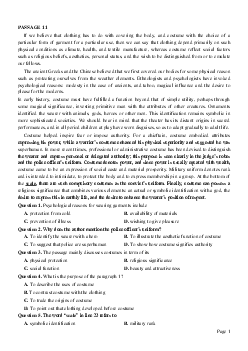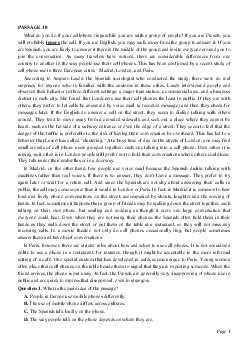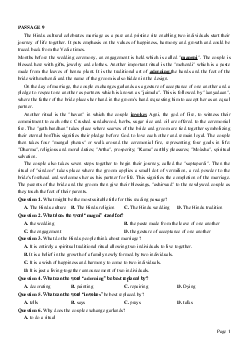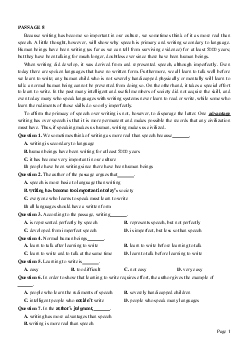

Preview text:
PASSAGE 1
By adopting a few simple techniques, parents who read to their children can considerably increase their
children’ s language development. It is surprising, but true. How parents talk to their children makes a big
difference in the children’s language development. If a parent encourages the child to actively respond to what
the parent is reading, the child’s language skills increase. A study was done with two or three-year-old
children and their parents. Half of the thirty children participants were in the experimental study; the other
half acted as the control group. In the experimental group, the parents were given a two-hour training
session in whichthey were taught to ask open-ended questions rather than yes-no questions. For example,
the parent should ask, “What is the doggy doing?” rather than, “Is the doggy running away?”
Experimental parents were also instructed how to expand on their children’ s answer, how to suggest
alternative possibilities, and how to praise correct answers.
At the beginning of the study , the children did not differ on levels of language development, but at the end
of one month, the children in the experimental group were 5.5 months ahead of the control group on a test
of verbal expression and vocabulary . Nine months later, the children in the experimental group still
showed an advance of 6 months over the children in the control group.
Question 1. Parents can give great help to their children’s language development by them. A. adopting B. reading to C. experimenting D. responding to
Question 2. What does the word “they” in the second paragraph refer to? A. Participants B. Parents C. Children. D. Questions
Question 3. During the training session, experimental parents were taught to .
A. study many experiments
B. use yes-no questions
C. give correct answers
D. ask open-ended questions
Question 4. What was the major difference between the control group and the experimental one in the study?
A. The training that parents received
B. The books that were read
C. The number of participants
D. The age of the children
Question 5. What conclusion can be drawn from this passage?
A. Children’s language skills increase when they are required to respond actively .
B. The more children read, the more intelligent they become.
C. T wo or three-year-old children can be taught to read actively .
D. Children who read actively always act six months earlier than those who don’t. Page 1 ĐÁP ÁN 1-B 2-B 3-D 4-A 5-A
LỜI GIẢI CHI TIẾT Question 1: B
Giải thích: Trong bài có đoạn: “parents who read to their children can considerably increase their
children’ s language development.” Vì v ậy đáp án “reading to” là đáp án thích h ợp nhất. Question 2: B
Giải thích: Trong bài có đoạn: “the parents were given a two-hour training session in which they were taught
to ask open-ended questions rather than yes-no questions”. “They” ở đây ngụ ý “Parents” . Đáp án B là đúng. Question 3: D
Giải thích: T rong bài có đoạn: “the parents were given a two-hour training session in which they wer e taught
to ask open-ended questions rather than yes-no questions ”. Đáp án đúng là D. Question 4: A
Giải thích: T rong đoạn 2 ta th ấy cha mẹ học sinh của nhóm “the experimental group ” sẽ được tham gia l ớp
đào tạo “ the parents were given a two-hour training session ” trong khi đó cha mẹ của nhóm “the control group” thì không. Question 5: A
Giải thích: Sau khi đọc cả bài chúng ta có th ể kết luận rằng: “If a parent encourages the child to actively
respond to what the parent is reading, the child’ s language skills increase.” (N ếu trẻ được khuyến khích
đáp lại nhiệt tình những gì bố mẹ đọc, thì các kỹ năng ngôn ng ữ của trẻ sẽ phát triển). Page 2




